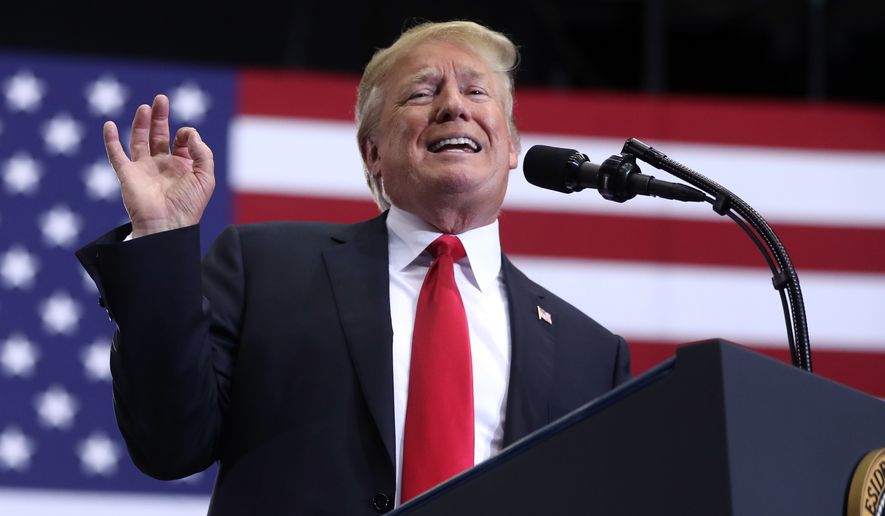President Trump said Wednesday that talk of a Democratic “blue wave” election is overblown and said results from this week’s primaries suggest the country might be looking instead at “a big red wave.”
Analysts, though, said they weren’t sure where Mr. Trump is getting his numbers. Democrats managed to swing a state Senate seat in Missouri, appeared to shut Republicans out of California’s Senate race and got their own candidates on the final ballot in each of the key U.S. House races in California.
Republicans did manage to get John Cox into the top-two runoff for California governor and said they were excited about candidates who won their primaries in key Senate races.
Mr. Trump led the postprimary cheerleading by challenging the prevailing wisdom that Republicans are facing a major headwind.
“Great night for Republicans!” Mr. Trump said on Twitter Wednesday morning. “Congratulations to John Cox on a really big number in California. He can win. Even Fake News CNN said the Trump impact was really big, much bigger than they ever thought possible. So much for the big Blue Wave, it may be a big Red Wave.”
The Republican National Committee suggested that Mr. Trump was looking at turnout numbers that showed enthusiasm for some of those Republican candidates.
But Matt Barreto, a political science professor at the University of California, Los Angeles, and co-founder of polling firm Latino Decisions, said nearly all of the regular, special and primary elections have shown a surge for Democrats since last year.
“In every single election that has taken place since the November 2017 Virginia statewide, to every other special election, primary election across the country, the number of Democratic ballots cast has increased at rates far greater than Republican ballots cast as compared to 2014 midterms,” he said. “As you know well, [Mr. Trump] does not rely on any actual data or empirical facts for his statements.”
Voters picked final candidates in races in Alabama, Iowa, Mississippi, Montana, New Jersey, New Mexico, South Dakota and California on Tuesday. California was the biggest and most chaotic prize on the table.
Thanks to the state’s “jungle primary” system, the top two vote-getters, regardless of party, advance to the general election.
Democrats feared a glut of candidates in some districts would fragment their vote and shut them out of some races where they hope to capture Republican seats in November. But in every target, they managed to get a candidate on the ballot.
“It’s clear that Democrats are in a stronger position than ever to take back the House, and winning districts in California will be central to that path,” said Tyler Law, a spokesman for the Democratic Congressional Campaign Committee.
Republicans also were locked out of the race to unseat Sen. Dianne Feinstein California Democrat. She breezed through the primary and will face off against Kevin de Leon, a favorite of liberal activists, who finished a distant second.
In the governor’s race, Trump-endorsed Mr. Cox finished second behind Lt. Gov. Gavin Newsom, a Democrat, and both advance to the general election, giving Republicans a candidate atop the ticket.
In Montana, Republicans were happy to see state auditor Matt Rosendale emerge victorious in the primary race and move on to challenge Sen. Jon Tester, a vulnerable Democrat.
Republican National Committee officials highlighted news reports that suggested the anti-Trump surge that Democrats are banking on this fall never came to fruition in the primaries.
They stressed that Democratic turnout was down more than Republican turnout compared with 2016. They also said Republican candidates combined for more votes than Democrats in six of the seven competitive California congressional districts.
“The political pundits just don’t get what is going on out there - or they do get it but refuse to report the facts!” Mr. Trump said on Twitter.
He singled out Rep. Dana Rohrabacher for congratulations after the California Republican beat back a slew of challengers in the 48th Congressional District.
He was still awaiting word Wednesday on his next opponent, with Harley Rouda and Hans Keirstead locked in a tight battle for second place.
Republican Rep. Jeff Denham appeared to be headed for a showdown with Democrat Josh Harder, a venture capitalist, in California’s 10th Congressional District. The race is considered a toss-up.
Rep. David G. Valadao was another bright spot for Republicans. The incumbent lawmaker outran Mr. Trump in the district by 16 percentage points, according to the Los Angeles Times, and is favored by political handicappers in his general election race against Democrat T.J. Cox.
For Democrats, Katie Hill, who runs a nonprofit homeless shelter, looked to be the next opponent for Rep. Stephen Knight in the 25th Congressional District, and Katie Porter was in line to take on Rep. Mimi Walters in the 45th Congressional District.
Ms. Porter’s projected win was celebrated by both the left and the right.
Stephanie Taylor, co-founder of the Progressive Change Campaign Committee, said there was a reason why Mrs. Porter was the sole candidate whom Sen. Elizabeth Warren, Massachusetts Democrat, endorsed in the primaries.
“This election was a referendum on the popularity of bold economic-populist ideas like Medicare for all, holding Wall Street and Big Insurance companies accountable, and fighting for working families — and those ideas won,” Ms. Taylor said.
The Congressional Leadership Fund, which is aligned with House Speaker Paul D. Ryan, Wisconsin Republican, said Mrs. Porter “is far too liberal for California’s 45th Congressional District.”
Democrats also put forward candidates in New Jersey that they believe will have a good chance of picking up a couple of Republican-held seats left open by retirements, and put up strong challenges against Republican Reps. Leonard Lance and Tom MacArthur.
• Seth McLaughlin can be reached at smclaughlin@washingtontimes.com.




Please read our comment policy before commenting.